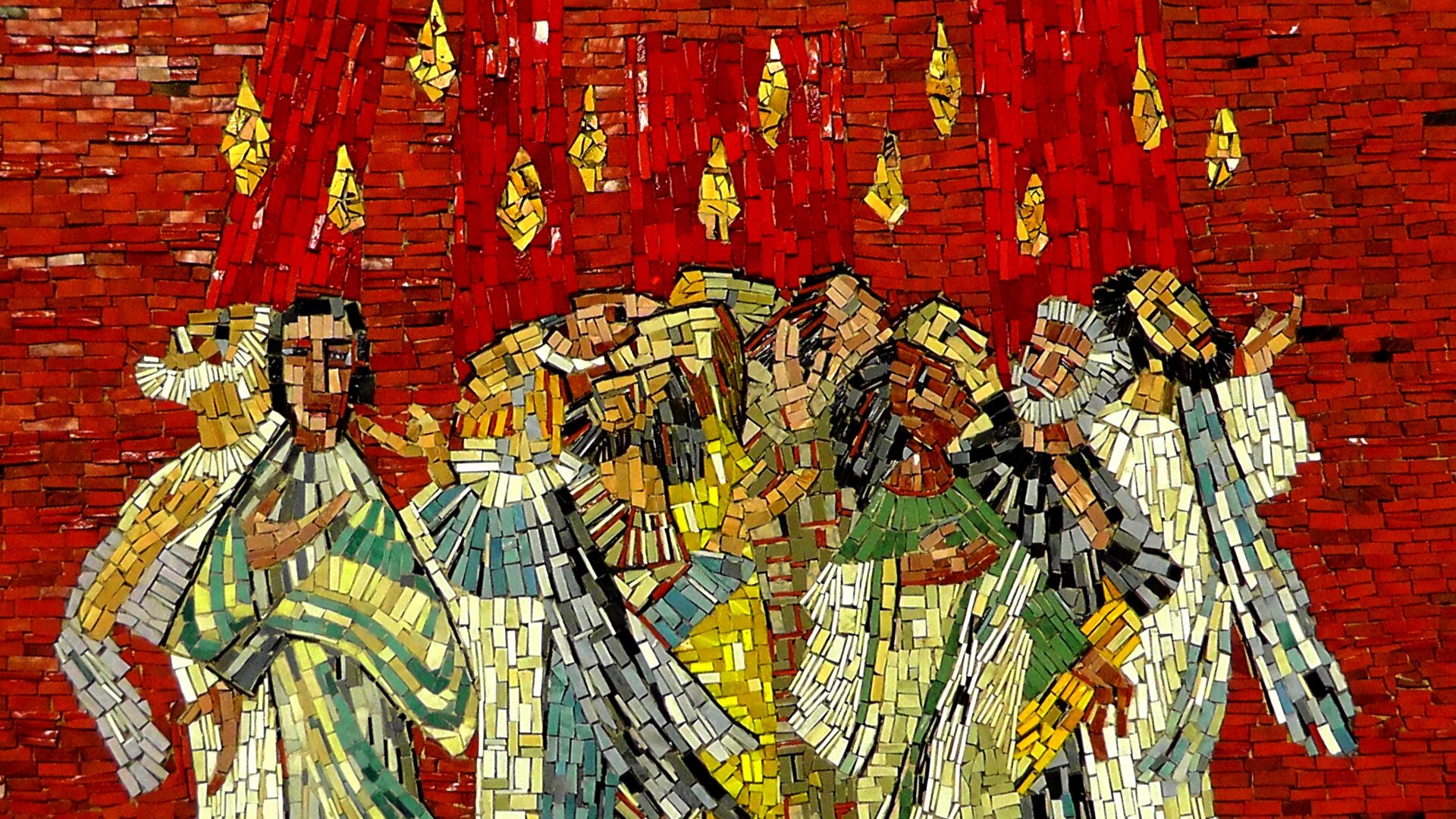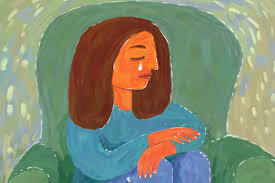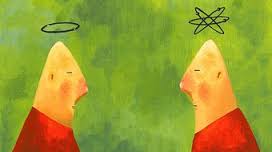The Book of Genesis
In the year 587 B.C., the Jewish people were conquered by the Babylonians and taken into captivity. They would remain in Babylonia for 48 years as slaves in a foreign land. One of the most important consequences of all this for the leaders of the Jewish people was the impact of this foreign land on the religion the Jews had held sacred for centuries. Their people were becoming more and more influenced by the religion of the Babylonians, and many were becoming attracted to it.
What was especially influential was the Babylonian account of creation, which was celebrated in great festivals and read publicly for all to hear. This account called Enuma Elish was a very creative depiction of the creation of the world, the beginnings of the human race, the nature of the gods, and so forth.
Because this was so popular a story and was influencing their people so extensively, the Jewish leaders set out to counter this story with one of their own. What we now call the creation story in the Book of Genesis was the Jewish response and corrective to Enuma Elish.
The Book of Genesis begins with the Jewish belief about who God is, how He created the world, how men and women were created, how sin and evil came into the world, and attempted to answer questions that troubled all people at that time, and up to this very day. Questions like: why do women go through so much pain in child birth? Why do men have to labor so hard to bring food to the table? Why is there so much violence in the world? Why are there so many different languages? And a host of other questions.
Genesis begins with the story of a particular God. The God the Jewish people called Yahweh. From the very beginning it pictures Yahweh as totally different in nature and character from the Babylonian god. Unlike the Babylonian god, Yahweh is eternal and uncreated. He creates out of nothing and creates by mere command. “Let there be light.” And there is light. Man and woman are created in the very image of God Himself. Man and woman are given dominion over the earth.
What Genesis teaches is that there is only one God. It teaches that humanity was created to be good, free, and godlike, not mere slave creatures as the Babylonians believed. But perhaps most importantly it taught that the God Yahweh is a saving God. God saves His people from meaninglessness and chaos. We are told in this book that not only do we have meaning, but we humans are called into partnership with God to create a world that is free of sin, free of violence, free of slavery, free of dominion over one another.
The first part of Genesis tells the story of creation. These creation accounts (there are two of them) are the best known parts of Genesis. They emphasized our call by God to choose to live in accord with the divine image, to become like our God.
Unfortunately, as we all know, though the story begins so beautifully and powerfully, it continues sadly. The Book of Genesis next tells the story of the fall from grace, the story of how we humans freely choose to disorder the world, to live not in likeness to our God, but in disobedience to the One in whose image we were so hopefully made.
In this very famous part of the story, we are told of how disobedience becomes a central theme, and how it reverses everything that Adam and Eve had known up until that time. We are told further that the Man and the Woman begin to trick one another, hide from one another, blame one another, and even try to hide from God Himself. Still, we are also told how nonetheless God acts to save them by making clothes for them as they leave the garden. God is ever present to them and always wishing nothing but their salvation.
The next part of Genesis involves the children of Adam and Eve, Cain and Abel. This is a story of fratricide, brother killing brother. This is presented in the Book of Genesis as the primal sin throughout the history of Israel. We see it later in the stories of Jacob and Esau, Joseph and his brothers, and David’s sons Absalom and Amnon, to name just a few.
One of the subthemes of Genesis is the battle that took place between those who were farmers, tillers of the soil, and those who became city dwellers. Cain represents the move to the cities and the violence that increases as a consequence. This violence brought into the world by Cain is shown to increase and become more and more senseless.
The next major part of Genesis is the story of Noah and the Ark, and the covenant that God makes with His people. We all know the story pretty well. The cause of the flood is humanity’s evil. God orders Noah to build an ark and bring into it one pair of each kind of animal. The flood lasts 40 days and 40 nights. After the waters recede, Noah and the animals disembark and a rainbow is given as a sign that God will never destroy the earth by means of a flood again.
Then we have the story of Babel. This story explains the origin of the various human languages. This is an aspect of human culture that we do not understand terribly well in our own day, but the curiosity of the Israelites, since all are now descended from Noah as the last story tells us, is understandable.
Now a fundamental shift takes place in the Book of Genesis. The story moves from a universal history to the history of one man and his family. Abraham, his family, and their troubles are now introduced.
This story makes up the rest of the Book of Genesis. It is a very complicated one, has many subplots, and involves four generations of people. But the major thrust of the story begins with God promising Abraham land, a place where he can be rooted in the world. In God’s speech to Abraham, He tells him that He will make of him a great nation, that He will bless him, make his name great, and in him all the families of the world will be blessed.
The most powerful of all the Abraham stories is the one in which he hears a divine voice telling him to sacrifice his son Isaac. He complies with the command, but is stopped from killing his son by another divine command, which tells him to desist because it is evident that he fears God. This story is so powerful that it is spoken of in the Letter to the Hebrews, and is the second of the Old Testament readings in our Easter Vigil service. From the Christian point of view, this story is a foreshadowing of the ordeal of Christ himself being sacrificed on a cross.
The story of Genesis now picks up with the next generation. Here we are told about how Jacob cheats Esau out of his birthright, how Jacob wrestles with God, how Jacob earns God’s blessing, and how fraternal strife again shows its ugly face.
Finally, we come to the story of Joseph, his betrayal by his brothers, his rise to power in Egypt, his challenge to his brothers, and his reconciliation with his family. An important introduction is made in this part of the Genesis story. It is the motif of dreams. This marks a very real change in the religious atmosphere of Genesis. God Himself does not intrude in this part of the story. Rather God influences people’s actions either by means of significant dreams or simply by guiding the actions that they take. Joseph’s brothers meant to harm him, but God was able to use their ill-intended actions for a good end. In other words, God’s plans for humanity are carried forward despite human failures and sins. God saves humanity despite itself and can even use evilly intended acts to create a good effect.
God saves. This is the central theme of the entire Book of Genesis. From the beginning with creation, through the Fall, through the horror of Cain killing his brother, through Noah and the sins that caused the flood, through Abraham’s willingness to sacrifice his son, through Josephs’ betrayal and his reconciliation with his brothers, through it all even to this day, THE ultimate message of the Book of Genesis and our whole faith tradition is this one belief: God saves. No matter what, God always saves. And He calls us to partner with Him in that divine act.





